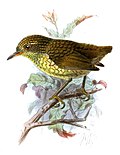Cacholote
| Cacholote | |
|---|---|

| |
| Brown cacholote (Pseudoseisura lophotes) | |
| Scientific classification | |
| Domain: | Eukaryota |
| Kingdom: | Animalia |
| Phylum: | Chordata |
| Class: | Aves |
| Order: | Passeriformes |
| Family: | Furnariidae |
| Genus: | Pseudoseisura Reichenbach, 1853 |
| Type species | |
| Anabates gutturalis White-throated cacholote D'Orbigny & Lafresnaye, 1838 | |
| Species | |
|
Pseudoseisura cristata | |
The cacholotes are four species of relatively large, heavy-billed furnariids in the genus Pseudoseisura. They are found in shrubby habitats in the South American countries of Brazil, Bolivia, Argentina, Paraguay and Uruguay. They are essentially brown (ranging from deep rufous to pale gray-brown depending on species), and all are crested to some extent.
Taxonomy
The genus Pseudoseisura was introduced in 1853 by the German naturalist Ludwig Reichenbach to accommodate the white-throated cacholote.[1][2] The name combines the Ancient Greek pseudos meaning "false" and seisoura, a bird mentioned by the Greek lexicologist Hesychius of Alexandria and believed to be a wagtail Motacilla.[3]
Species
The genus contains four extant species:[4]
| Image | Scientific name | Common Name | Distribution |
|---|---|---|---|
 |
Pseudoseisura cristata | Caatinga cacholote | Caatinga in north-eastern Brazil. |
 |
Pseudoseisura unirufa | Grey-crested cacholote | Pantanal-region in Brazil, Paraguay and Bolivia |
 |
Pseudoseisura lophotes | Brown cacholote | northern Argentina, western Paraguay and Uruguay; also in southeastern Bolivia and Rio Grande do Sul |
 |
Pseudoseisura gutturalis | White-throated cacholote | Argentina (Patagonia and the northwest). |
The allopatric Caatinga and gray-crested cacholotes were formerly considered conspecific under the name rufous cacholote (Pseudoseisura cristata).[5]
Fossil species:
- †Pseudoseisura cursor (Pleistocene of Argentina)[6]
References
- ^ Reichenbach, Ludwig (1853). "Icones ad synopsin avium No. 10 Scansoriae A". Handbuch der speciellen Ornithologie (in German). Vol. 6. Dresden und Leipzig: Expedition Vollständigsten Naturgeschichte. pp. 145–218 [146, 168].
- ^ Peters, James Lee, ed. (1951). Check-List of Birds of the World. Vol. 7. Cambridge, Massachusetts: Museum of Comparative Zoology. p. 122.
- ^ Jobling, James A. (2010). The Helm Dictionary of Scientific Bird Names. London: Christopher Helm. p. 321. ISBN 978-1-4081-2501-4.
- ^ Gill, Frank; Donsker, David; Rasmussen, Pamela, eds. (January 2021). "Ovenbirds, woodcreepers". IOC World Bird List Version 11.1. International Ornithologists' Union. Retrieved 30 June 2021.
- ^ Zimmer, Kevin J.; Whittaker, Andrew (2000). "The Rufous Cacholote (Furnariidae: pseudoseisura) is two species" (PDF). The Condor. 102 (2): 409–422. doi:10.1650/0010-5422(2000)102[0409:TRCFPI]2.0.CO;2. S2CID 85801003.
- ^ Tonni, Eduardo P.; Norieg, Jorge I. (2001). "Una especie extinta de Pseudoseisura Reichenbach 1853 (Passeriformes: Furnariidae) del Pleistoceno de la Argentina: Comentarios Filogeneticos" (PDF). Ornitologia Neotropical. 12 (1): 29–44.

